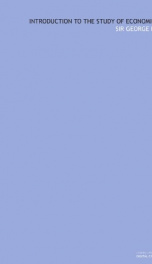the elements of economics

Purchase of this book includes free trial access to www.million-books.com where you can read more than a million books for free. This is an OCR edition with typos. Excerpt from book: CHAPTER III THE PRODUCTION OF WEALTH I. A General Survey § 17. Since man does not create matter, the production of wealth does not mean the creation of something that was previously non-existent. The most that production human powers are able to do is to create deflned- utilities; and production means, therefore, changing the forms or relations of matter so that it becomes better fitted to satisfy human wants. Wood or iron can be converted into houses or machines; seeds can be placed in the ground where natural forces act upon them and stimulate the growth of plant life; Dakota wheat can be transported to Liverpool, acquiring increased utility by the change of place. In these, and all other cases, production means the creation of utilities. § 18. In the development of the arts of production five historical stages can be distinguished. In the most primitive stage wealth is obtained by hunting and fishing, with the aid of the simplest weapons economic and implements. The second is the stage of pastoral industry, in which men domesticate various animals, and depend chiefly upon their herds for food and clothing. A third stage is reached when men learn to raise plants as well as to rear animals. Pastoral peoples are, of necessity, nomads, since they are compelled tomove about from place to place in search for the best pastures for their flocks; but when agriculture becomes the principal industry, men settle permanently upon the land which they have improved, and nomadic existence comes to an end. The fourth stage is marked by the development of manufactures and commerce. Handicrafts, which pre- The viously have been merely subsidiary to agri- handicrafts ' ii stage. culture, are now greatly improved, and occupy a larger number of workers. Division of labor gra...
Info about the book
Author:
Series:
Unknown
ISBN:
0934380694
Rating:
4.5/5 (3)Your rating:
0/5
Languge:
English
Users who have this book
Users who want this book
What readers are saying
What do you think? Write your own comment on this book!
write a commentGenre
if you like the elements of economics try:
Do you want to exchange books? It’s EASY!
Get registered and find other users who want to give their favourite books to good hands!


